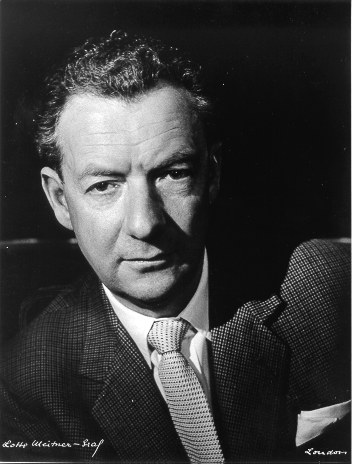 |
| Trinchera en la I Guerra Mundial Foto tomada de www.dailymail.co.uk |
 |
| Benjamin Britten 1913-1976 |
De la información contenida en el ábum, extraigo algunas ideas:
Lo extraordinario es que, luego de dos guerras mundiales que decimaron la mejor juventud de dos generaciones, y la tortura masiva, asesinato y destrucción en una escala sin precedentes en la historia mundial, haya habido sobrevivientes para contar la historia. Wilfred Owen, incomparable poeta de la Gran Guerra, no la sobrevivió, y no pensó que sus elegías del frente pudieran ser de ayuda a su propia generación. "Puede ser a la próxima... Todo lo que un Poeta puede hacer hoy es advertir. Es por ello que el verdadero poeta debe ser verídico". Notemos el acento sobre la "verdad". El Poeta -Owen no utiliza la P mayúscula en vano- es de aquellos que Ven, que Saben, en quienes el don de la visión se acompaña de videncia, y que, contrariamente a nosotros, toman al vuelo aspectos de la realidad desde la esquina de sus ojos.Los poemas elegíacos de Wilfred Owen que incluye Britten en este Requiem de Guerra tocan lo más profundo de los sentimientos humanos en torno a los horrores de la guerra. Trascribo a continuación los tres primeros; en verdad vale la pena tenerlos en cuenta:
 |
| Wilfred Owen en 1916 |
I
What passing-bells for these who die as cattle?
Only rthe monstruous anger of the guns.
Only the struttering riffles' rapid rattle
Can patter out their hasty orisons.
No mockeries for them from prayers or bells,
Nor any voice of mourning save the choirs, -
The shrill, demented choirs of wailing shells;
And bugles calling fot them from sad shires.
What candles may be held to speed them all?
Not in the hands of boys, but in their eyes
Shall shine the holy glimmers of good-byes.
The pallor of girls' brows shall be their pall;
Their flowers the tenderness of silent minds,
An each slow dusk a drawing-down of blinds.
II
Bugles sang, saddening the evening air;
And bugles answered, sorrowful to hear.
Voices of boys were by the river-side.
Sleep mothered them; and left the twilight sad.
The shadow of the morrow weighed on men.
Voices of old despondency resigned,
Bowed by the shadow of the morrow, slept.
III
Out there, we've walked quite friendly up to Death:
Sat down and eaten with him, cool and bland, -
Pardoned his spilling mess-tins in our hand.
We've sniffed the green thick odour of his breath,-
Our eyes wept, but our courage didn't writhe.
He's spat at us with bullets and he's coughed
Sharpnel. We chorused when he sang aloft;
We whistled while he shaved us with his scyte.
Oh, Death was never enemy of ours!
We laughed at him, we leagued with him, old chum.
No soldier's paid to kick against his powers.
We laughed, knowing that better men would come,
And greater wars; when each proud fighter brags
He wars on Death - for Life; not men - for flags.
 |
| Soldado herido, por Otto Dix |
La interpretación que presento es la del Festival de música Schleswig-Holstein de 1992, dirigida por Sir John Eliot Gardiner (no tengo más datos). Sigo prefiriendo la original bajo la batuta de Britten.
Brutal...
ResponderEliminarComo la guerra.
Eliminar